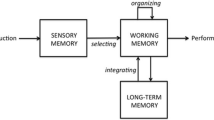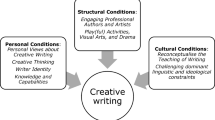Abstract
In a market place crowded with practical rhetoric books what educational value could a challenging work such as Kenneth Burke’s A Rhetoric of Motives (1950) possibly have? Burke knows but doesn’t use the terminology of the classical art and rather than analysing the persuasive rhetoric of well-known speeches to equip us with strategies, he weaves his way around literary texts, teasing out meanings that their authors something intended, sometimes did not. Yet, despite such difficulties, A Rhetoric of Motives is a practical rhetoric book. It is just that its process of explication teaches us to think well. This essay tries to explain Burke’s rethinking of the purpose and contents of a traditional teaching tool—the rhetorical handbook—and defends the value of literary-rhetorical reading that aims to ‘equip’ citizens to think openly.
Similar content being viewed by others
Notes
The Oxford English Dictionary, http://www.oed.com/, accessed 07.02.2014.
References
Bender, J., & Wellbery, D. E. (Eds.). (1990). The Ends of Rhetoric: History, Theory, Practice. Stanford: Stanford University Press.
Biesecker, B. A. (2000). Addressing Postmodernity: Kenneth Burke, Rhetoric, and A Theory of Social Change. Tuscaloosa, London: University of Alabama Press.
Biesta, G. (2009). Good Education in an Age of Measurement: On the Need to Reconnect with the Question of Purpose in Education. Education and Assessment, Evaluation and Accountabuility, 21(1), 33–46.
Biesta, G. (2012). Becoming World-wise: An Educational Perspective on the Rhetorical Curriculum. Journal of Curriculum Studies, 44(6), 815–826.
Burke, K. (1966). Language as Symbolic Action: Essays on Life, Literature, and Method. Berkeley: University of California Press.
Burke, K. (1969). A Rhetoric of Motives. Berkeley: University of California Press.
Burke, K. (1998). Literature as Equipment for Living. In D. H. Richter (Ed.), The Critical Tradition: Classic Texts and Contemporary Trends (2nd ed., pp. 593–598). Boston: Bedford Books.
Cockcroft, R., & Cockcroft, S. (2005). Persuading People: An Introduction to Rhetoric. Basingstoke: Palgrave Macmillan.
Enoch, J. (2004). Becoming Symbol-Wise: Kenneth Burke’s Pedagogy of Critical Reflection. College Composition and Communication, 56(2), 272–296.
Forsyth, M. (2013). The Elements of Eloquence: How to Turn the Perfect English Phrase. London: Icon Books Ltd.
Herrick, J. (2004). The History and Theory of Rhetoric: An Introduction. Boston, MA: Allyn and Bacon.
Leith, S. (2011). You Talkin’ to Me? Rhetoric from Aristotle to Obama. London: Profile Books.
Mack, P. (2005). Rhetoric, Ethics and Reading in the Renaissance. Renaissance Studies, 19(1), 1–21.
Montgomery, K. (2006). How Doctors Think: Clinical Judgment and the Practice of Medicine. Oxford: Oxford University Press.
Newstok, S. L. (2007). Kenneth Burke on Shakespeare. West Lafayette, IN: Parlor Press.
Quintilian (2001). Institutio Oratoria, trans. Donald A. Russell. Cambridge M.A.: Harvard University Press.
Richards, J. (2007). Rhetoric: A New Critical Idiom. Abingdon: Routledge.
Rutten, K., & Soetaert, R. (2012). Revisiting the Rhetorical Curriculum. Journal of Curriculum Studies, 44(6), 727–743.
Shakespeare, W. (1984). In Harold Jenkins(ed), Hamlet. London and New York, Methuen.
Slavin, R. (2002). Evidence-based Educational Policies: Transforming Educational Practice and Research. Educational Researcher, 31(7), 15–21.
Yankah, K. (2012). The Proverb in the Context of Akan Rhetoric. New York: Diasporic African Press.
Author information
Authors and Affiliations
Corresponding author
Rights and permissions
About this article
Cite this article
Richards, J. Equipment for Thinking: or Why Kenneth Burke is Still Worth Reading. Stud Philos Educ 34, 363–375 (2015). https://doi.org/10.1007/s11217-014-9434-3
Published:
Issue Date:
DOI: https://doi.org/10.1007/s11217-014-9434-3




